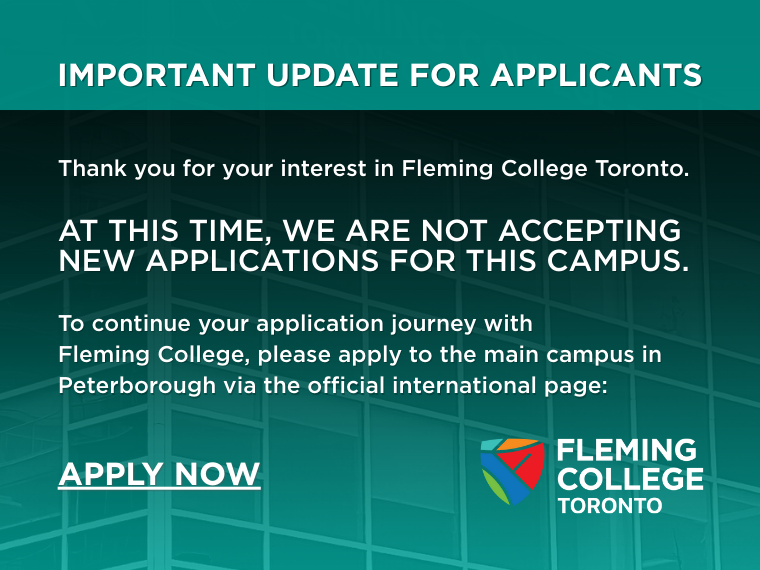Gain a broad and transferable skill set for a career in configuring and troubleshooting computer systems. Core courses are complemented by training in oral and written communications, customer relations, and teamwork, preparing you for career opportunities in a range of sectors. You will also learn about solving computer problems that can cause both major costs and setbacks for businesses, whether due to a major hardware failure or a minor software incompatibility.
-
Program Code:
-
CGT
-
Credential:
-
Diploma
-
Duration:
-
Two Years
(Four Semesters)
-
Intakes:
-
Fall (September),
Winter (January),
Spring (May)

Fees
| Semesters | Semester 1 | Semester 2 | Semester 3 | Semester 4 |
|---|---|---|---|---|
| Tuition | $8,475.00 | $8,475.00 | $8,475.00 | $8,475.00 |
| Ancillary Fees | $814.49 | $500.99 | $1,364.49 | $894.99 |
| Health Insurance | $700.00 | N/A | $700.00 | N/A |
| Semester Total | $9,989.49 | $8,975.99 | $10,539.49 | $9,369.99 |
| Academic Year Total | $18,965.48 | $19,909.48 | ||
| Total Program Fees | $38,874.96 | |||
*Tuition and fees subject to changes.
*Health insurance is mandatory and non-refundable.
Scholarships and Awards:
Entrance scholarships and awards are available here
Program Highlights
- Prepare for industry certification exams such as A+ and Cisco Networking.
- Identify, analyze, develop, implement, verify and document the requirements for a computing environment.
- Meet all the academic requirements for certification in the Certified Engineering Technician (Ctech) category, provided all other eligibility criteria are met.
- Apply project management principles and tools when working on projects within computing environments.
- Contribute to the development and maintenance of software applications.

Why Choose Fleming College Toronto
- Build your networking community with an international classroom and unprecedented access to Canada’s bustling tech industry capital, Toronto.
- Expect innovative course content through traditional lectures, applied research, advanced computer lab training, guest speakers and more, supported by faculty from a wide range of disciplines and industries.
- Access to an extensive suite of support services, such as career services, academic counselling, housing and more.
- Enjoy the benefits of cosmopolitan life, including a thriving job market, cultural diversity and networking opportunities.
Minimum Admission Requirements
Students applying to Computer Engineering Technician must meet the following requirements:
- Ontario Secondary School Certificate (OSSD) or equivalent. Please check the Ontario Secondary School Diploma Equivalency page for secondary education completed internationally.
- Gr 12 C English and Gr 12 C Mathematics.
- Successful completion of FCT ELB 5 or IELTS Academic Overall 6.0 with no band score less than 5.5 or equivalent (students applying through the SDS stream must have an overall 6.0 with no bands less than 6.0). You can check the Language Requirements page to understand other options to meet the FCT language requirement.
Technology Requirements
Students are required to have their own computer, internet access, webcam and microphone. Some required software applications are not available for MAC OS or Chromebook. Computer must be virtual machine capable. No tablets or Chromebooks for lab work. For this program, the following system specifications are required:
Microsoft Computer
Operating System: Windows 10
Processor: Core i5 – 1.6 GHz
Memory: 8 GB
Hard disk: 160 GB
Apple Computer
Operating System: MacOS 10.12
Processor: Core i5 – 6th Gen
Memory: 8 GB
Hard disk: 160 GB
Internet
Download speed: 2.5 Mbps
Upload speed: 3.0 Mbps

Career Opportunities
Computer technicians enjoy a wide range of opportunities in various industries. Here are just a few of the possible career outcomes.
- Embedded system support
- Customer service representative
- Technical sales and support representative
- Technical support analyst
- Computer user support
- Systems testing technician
- Help desk technician
Program Courses
Communications I is an introductory course that provides a foundation in college-level communications by teaching students to read critically, write appropriately for a variety of audiences, conduct and cite research, and revise for clarity and correctness. In seminars and labs, students will engage in both independent and collaborative activities, including the development of a digital portfolio designed to help them become more effective communicators in academic and professional environments.
Today, computers can take on a variety of forms, including household appliances, vehicles, and even human implants. Regardless of the devices’ shape, size, or complexity, however, a common factor between them all is the computer hardware. During this course, students will obtain a foundational understanding of the core hardware components that make up modern computers. Through experiential learning exercises and involved experimentation, students will leave the course prepared for in-demand industry certifications and having taken their first steps into the information technology landscape.
This course introduces students to the fundamental concepts of electricity and electrical test equipment. Topics to be covered include: basic DC and AC principles, such as voltage, current, resistance, power and the laws that govern them. Students will also learn how to work with components such as resistors, inductors, capacitors and test equipment, including digital multimeters, power supplies and oscilloscopes. Upon completion of the course, students will be able to construct and analyze simple DC and AC circuits and use test equipment to verify their operation and troubleshoot them as needed.
As technology advances, so does cyber security. With exciting new developments in the field over recent years, it's essential that students are familiar with upcoming cyber trends and new avenues of digital evidence. This course will provide a broad overview of the field, introducing students to useful and current fascinating technologies. Students will leave with a greater understanding of cyber security and digital evidence, its terminology, software utilities for security professionals, and the necessary knowledge to tackle more advanced topics.
This course will enable students to apply foundational math concepts and acquire mathematical skills related to computing-based programs. Topic coverage will include algebra, number systems, engineering/scientific notation, and trigonometry. It is designed to complement and reinforce learning within other first semester courses.
To truly utilize a system to its full extent, one must first become accustomed to the fundamental aspects of the operating system (OS). Hidden just beneath the surface of our desktops, the OS is the main driving force of every system, managing file systems, threads and processes, memory, and much more. In this course, students will be introduced to the fundamentals of OSs, their configuration processes, and how to securely maintain and implement them. Through experiential learning exercises and involved experimentation, students will leave the course with a firm grasp on OS troubleshooting, its operational procedures, and the knowledge to begin pursuing a variety of in-demand industry certifications.
At one point or another, we've all wished we could automate a monotonous or tedious task. With a scripting language, you can do that and more! This course will introduce students to the programming fundamentals that make up scripting languages. Through experiential-learning exercises with an industry-standard scripting language, students will leave with a foundational understanding of these languages in addition to the practices to use them effectively during their careers.
Organizations today face the huge task of protecting and securing their sensitive data and information technology operations at many levels. Each year thousands of new vulnerabilities are discovered, and Billions of dollars are lost through malicious activity against corporate, government and private technological entities. In this course, Learners will be introduced to the core concepts of information security and protection; examine current threats and vulnerabilities and learn techniques to assess and manage risk in an information technology based environment. Using a common criteria methodology, Learners will analyze/demonstrate common system flaws, malware and control methods; and software for threat assessment and security controls will be explored. Learners will become familiar with the roles and responsibilities of an IT Security professional in relation to the management of risk and the conduct of related threat assessments. Emphasis will be placed on the importance of effectively assessing and making decisions to reduce risk.
This course is an introduction to semiconductors, including the diode family, the bipolar junction transistor (BJT) and the field effect transistor (FET). Applications of these devices are examined including the full-wave capacitor filtered rectifier, the BJT and FET switch and both small signal and power BJT amplifiers. Students learn to design, construct, analyze, and test electronic circuitry at the "breadboard" level. Students explore Digital logic and interfacing with microprocessors.
Introduction to Networks (ITN) covers the architecture, structure, functions and components of the Internet and other computer networks. Students achieve a basic understanding of how networks operate and how to build simple local area networks (LAN), perform basic configurations for routers and switches, and implement Internet Protocol (IP).
Linux is consistently the operating system (OS) of choice, from cars and smartphones to servers and supercomputers. As an open-source project, Linux is flexible enough to satisfy various computing niches, yet it is still well-maintained thanks to the innovation and support from its dedicated community. This course expands upon students' understanding of OS fundamentals, focusing on their presence within a Linux environment. Students will familiarize themselves with a comprehensive suite of advanced Linux utilities, facilitating system management, configuration, security, and troubleshooting through experiential learning exercises. Students leaving the course will be equipped with the practices and knowledge to utilize the full potential of Linux systems and pursue in-demand industry certifications.
Scripting Applications presents additional topics in Perl, Powershell and Python scripting. New scripting topics include subroutines, associative arrays, threads and child processes, socket programming and interfacing with SQL databases. Scripting techniques are applied to various security related and other technical applications like log file analysis, password brute forcing, network scanning, windows registry access and process monitoring. Practical exercises are hosted on a mix of Windows and Linux platforms.
All graduates of diploma programs require general education credits. These courses allow you to explore issues of societal concern by looking at the history, theory and contemporary applications of those issues.
Your program has designated some required general education courses.
Cybersecurity is a multi-billion-dollar industry, and it impacts us all. From social engineering scams targeting end-users to complex topics like encryption implementation, the work to secure digital infrastructure is endless and constantly evolving. This course is designed to establish baseline knowledge in the concepts, requirements, and operations of cybersecurity in a modern IT department. Students will understand different security threats and how to implement security safeguards effectively. Additionally, students will also gain an understanding of how cybersecurity integrates with other important business operations like physical security, governance and legal. This course maps to introductory industry certifications and will prepare students to complete the certification exam.
This course will provide the students with an introduction to digital electronics, logic design including programmable logic devices (PLD). Using low-level fixed function devices to highly complex programmable, erasable and reprogrammable devices will allow the student to experience the digital development life cycle associated with computer system design.
An embedded control system is a self-contained computer system that works in real-time to control devices such as motors, appliances, instrumentation, robots, cell phones, and others. This course introduces students to embedded interfacing by working with a microcontroller development board and integrated development environment. Students learn how to develop, modify and troubleshoot embedded software and create interfacing systems for basic input/output operations. The students will also learn how to connect the microcontroller to the Internet and develop a web interface to control devices connected to the microcontroller, remotely and display data collected by the microcontroller, in real-time.
This course will enable students to extend math concepts and applied mathematical skills required for an engineering technician program. Topic coverage will include functions, conics, regression and matrix algebra. Students will be evaluated on both algebraic and technology-assisted approaches.
In this course, students will learn to implement, build, test, and debug programs written in the C++ programming language. The course begins with a discussion of the essential elements of procedural programming - variables, data types, expressions, branches, loops, functions, and pointers - and then covers the basics of object-oriented programming - classes, objects and inheritance. Practical lab activities are performed in a Windows environment using Visual Studio.
Pre-Requisites
- Scripting Fundamentals (COMP 86)
Switching, Routing, and Wireless Essentials (SRWE) covers the architecture, components, and operations of routers and switches in small networks and introduces wireless local area networks (WLAN) and security concepts. Students learn how to configure and troubleshoot routers and switches for advanced functionality using security best practices and resolve common issues with protocols in both IPv4 and IPv6 networks.
All graduates of diploma programs require general education credits. These courses allow you to explore issues of societal concern by looking at the history, theory and contemporary applications of those issues.
Your program has designated some required general education courses.
Agile Project Management (APM) has become an integral part of teamwork and IT team structure. In all aspects of Information technology, It is an Iterative approach to planning and guiding project processes the students will be able to successfully implement agile methodologies and concepts such as project envisioning, team velocity, users stories and advanced risk management. Students will also be able to apply all the learning by executing the acquired knowledge along with best practices to be able to deliver successful Information Technology projects.
With network speeds increasing, and business needs ever-changing, cloud computing has established itself as the next frontier of modern computers. Due to the remote and flexible environment of cloud computing, a tailored approach to its security is necessary. This course introduces students to the concepts, practices, and logistics of cloud computing and cloud security. Students will manage and maintain cloud operating system configurations, access control, and virtualization through experiential learning exercises. As a result, students will have a strong understanding of cloud computing and security considerations, preparing them for in-demand certifications and their future careers.
Databases are an essential part of today's IT infrastructure, providing a flexible and scalable means for data to be efficiently stored and retrieved. Databases are not without their flaws, however, with poor implementations of them being vulnerable to injection and poisoning attacks. In this course, students will be introduced to the fundamentals of industry-standard database applications, their common vulnerabilities, and how to securely implement them in a business/IT environment. Students will leave the course with the skills to overcome database implementation challenges and the experience to properly utilize these applications during their careers.
Today's explosion of the machine-to-machine, embedded and internet of things worlds are spreading to all sectors of the market from healthcare to technology and everything in between. This course will introduce the students to various aspects of modern communication between those intelligent embedded devices and the end-user through cloud-based system wireless or wired systems. This course will present the students with the concept of system integration, with interoperability and secure embedded system data exchange.
This course is the third in a series of technology mathematics courses that are mandatory for students pursuing a technology diploma. All topics are covered with applicable problem sets both analytically and with the use of technology. The topics covered include limits, derivatives of algebraic and transcendental functions and their applications, selected methods of integration, differential equations, Laplace transforms, Maclaurin and Taylor series.
This course examines and builds soft skills like self-awareness, interpersonal relations, motivation, small group dynamics, and conflict management in order to recognize and utilize appropriate tools and strategies. Learning how to recognize a personal inventory of skills and competencies will improve both the process and products of independent and team-based work. The development and application of these tools and strategies will prepare students in finding, obtaining and retaining a position within their chosen career path.
All graduates of diploma programs require general education credits. These courses allow you to explore issues of societal concern by looking at the history, theory and contemporary applications of those issues.
Your program has designated some required general education courses.
Frequently Asked Questions (FAQ)
The key benefits of enrolling in a Computer Engineering Technician Diploma program include hands-on experience, acquiring technical knowledge of hardware and software and learning computer skills applicable to a range of industries.
A Computer Engineering Technician Diploma focuses more on providing more practical and hands-on skills. Apart from learning about scripting and hardware, you will also become a competent communicator and project manager.
The Computer Engineering Technician Diploma program prepares you for many career opportunities in diverse industries, including positions such as technical support analyst, computer user support, and systems checking technician.





